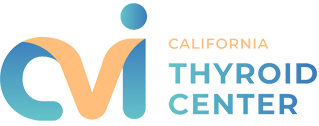Diagnosing Thyroid Nodules
Laboratory Tests
The initial laboratory assessment of a thyroid nodule includes the measurement of thyroid-stimulating hormone (TSH), T3, and T4. These results will determine if the thyroid gland is functioning properly or if there is an issue like hyperthyroidism or hypothyroidism. Most patients with a solitary thyroid nodule have normal levels of TSH.1
Serum antithyroid peroxidase (anti-TPO) antibody and antithyroglobulin (anti-Tg) antibody levels are important diagnostic tools if the patient has relevant history suggesting the possibility of an autoimmune disorder like Hashimoto thyroiditis.1
Ultrasound Imaging
Fine-Needle Aspiration Biopsy (FNAB)
FNAB is currently the most important diagnostic tool for thyroid nodules. Using a very fine needle, a doctor can gather a sample of thyroid tissue to diagnose the underlying condition. This procedure is usually quite simple and can be performed in a doctor’s office with local anesthesia.
The results of the FNAB can be divided into:
- Benign: the lesion has less than a 1% chance of being malignant.
- Atypia: the lesion has a 5 to 10% chance of being malignant.
- Follicular neoplasm: the lesion has a 20 to 30% chance of being malignant.
- Suspicious for malignancy: the lesion has a 50 to 75% chance of being malignant.
- Malignant: the lesion has a 100% chance of being malignant.
- Nondiagnostic: not enough cells were gathered, therefore a diagnosis cannot be obtained.
The use of ultrasound-guided FNAB yields better results and decreases the chance of having a nondiagnostic result, even on cystic or predominantly cystic nodules.1
Thyroid scintigraphy
This is a nuclear imaging study that uses radioactive isotopes to assess thyroid function. Nuclear imaging of the thyroid can be used to establish if a nodule is hot (hyperfunctioning), warm (normal), or cold (hypofunctioning).
This procedure is no longer a first-line option due to its high cost and the fact that there are better diagnostic tools available.

We are Here to Help
Request an appointment to meet with our RFA specialist who will review your imaging, labs and history to determine if you are a good candidate for the procedure, and the outcomes you can expect. Each person is an individual and should discuss the potential risks and benefits of thyroid RFA with our doctor to decide if this is the best option.
Appointments are available via an online video telehealth platform or in person in Los Angeles, California. Why should you choose us? Read here.
1.) Steven K Dankle, M. D. (2021, July 15). Thyroid nodule: Background, clinical outline, diagnostic workup. https://emedicine.medscape.com/article/127491-overview#a1
The above information explains what is involved and the possible risks. It is not meant to be a substitute for informed discussion between you and your doctor, but can act as a starting point for such a discussion.








